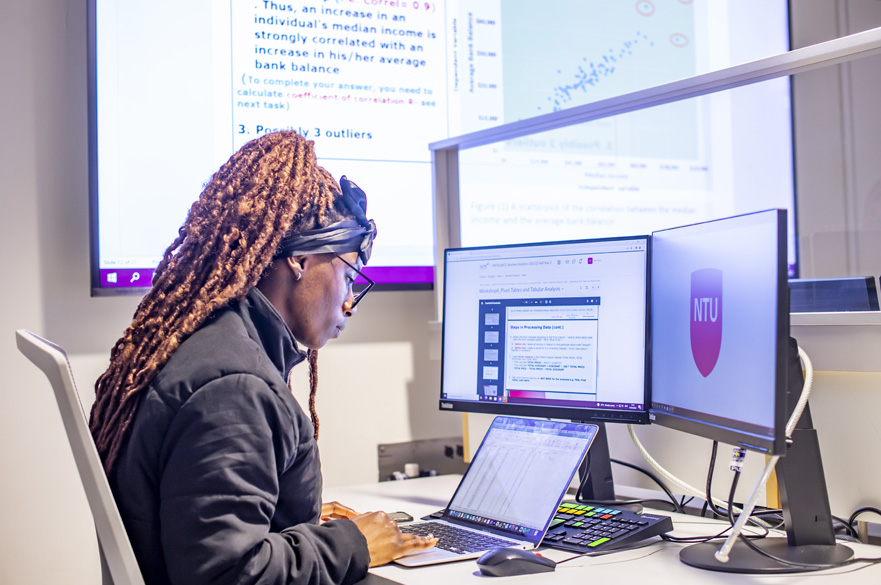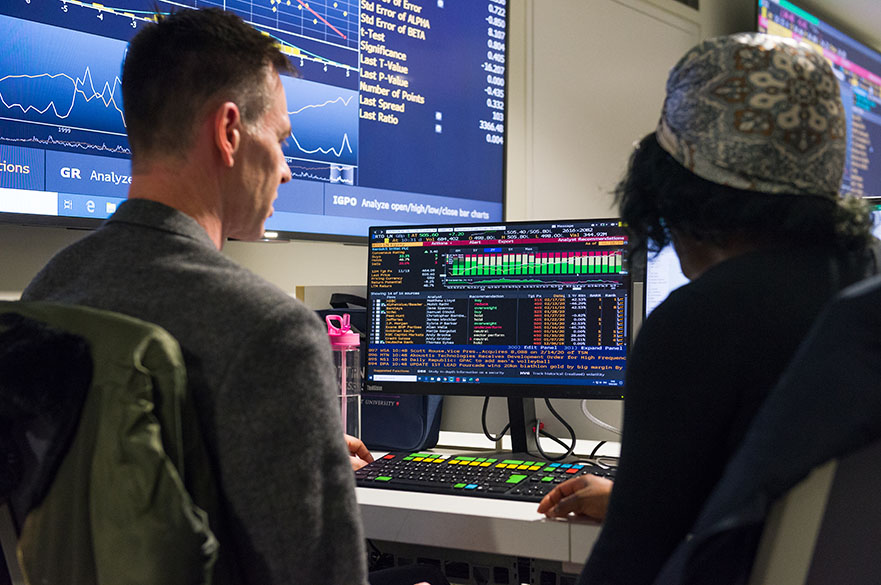Finance and Accounting MSc
About this course
A fundamental requirement of any successful organisation is to be able to manage its accounting and financial activities efficiently and effectively. This requirement has become more obvious in recent times as organisations have faced turbulent economic conditions, lending difficulties, risk management issues and the criticisms of governance. Our MSc Finance and Accounting degree is designed to enable you to become a critical member of an organisation’s core management team.
Through theoretical and empirical literature, case studies and interacting learning and teaching, you will develop a strong core knowledge of institutional, accounting and financial modelling frameworks. You will explore the operation of markets, their major participants and the regulatory environment, as well as building a firm understanding of corporate finance, basic accounting and financial analysis.
In your third semester, you’ll choose an experiential project. With the opportunity to use your skills in a real-world setting, you can choose from completing a consultancy experience project, a business research project or a global experience project.
What you’ll gain from this degree?
- an understanding of traditional and current theoretical principles, models and frameworks of strategic accounting and strategic financial management.
- an ability to apply knowledge, tools and techniques to resolve issues in new and diverse situations within the accounting discipline.
- a critical approach in evaluating the rigour and validity of published research and assessing its relevance to the practice of accounting.
- an understanding of the wider social, environmental and economic sustainability issues and their interrelationships which may be impacted by or have an impact on organisational activities.
-
This course allows a faster progression towards the CIMA Professional Qualification and the global professional designation of Chartered Global Management Accountant (CGMA).
-
You will be allocated an Academic Mentor at the beginning of the academic year and you will meet with them regularly throughout the year. Your Mentor will help you make the most of your time at NBS.
-
93% of MSc Finance and Accounting students were satisfied with the quality of their course (PTES 2024).
What you’ll study
At NBS you can create a personalised learning experience, giving you a unique Masters degree that equips you with the skills you'll need, for the career you want. Each of the modules will be delivered over a four week period, with teaching delivered in three weeks and the fourth week left clear for assessment work. This enables you to focus on one subject at a time, whilst allowing time for preparation and assessment work.
- Programme overview
- Semester one
- Semester two
- Semester three
- Ongoing learning/professional development
- Placement opportunities
Semester one modules
- Global Financial Markets
- Financial Statement Analysis
- Corporate Finance
Semester two modules
- Strategic Management Accounting
- Comparative Corporate Reporting
- Corporate Governance and Accountability
Semester three modules
Your choice of final semester project. Experiential projects include:
- Consultancy Experience Project; or
- Business Research Project
Module for those undertaking the 2 year course
- Placement Diploma in Industrial Experience
Semester one
Global Financial Markets (20 credits)
This module considers the key aspects of financial management of corporations in a multinational environment. This module deepens the analysis of the major markets, participants and instruments in a global context. This provides you with a detailed understanding of key finance theories and an opportunity to apply these theories to further develop your skills or critical analysis.
Financial Statement Analysis (20 credits)
The aim of financial statement analysis is to aid decision making processes, in an ethically acceptable manner, of internal and external stakeholders that ensures sustainability of organisational development. This module develops students’ critical understanding of financial reporting and ethical and sustainable issues through in depth application and evaluation of a range of analytical techniques and theoretical bases.
Corporate Finance (20 credits)
This module is designed to give you a deeper knowledge of theory and practice in the key aspects of corporate finance, and allows you to explore how various aspects of corporate finance are interrelated. You will assess the impact of financial decisions with respect to investments, financing and the management of risk and develop skills in critical analysis and evaluation.
Semester two
Strategic Management Accounting (20 credits)
This module introduces the main concepts and techniques employed by management accountants, and how management accounting fits within the context of the accounting field and in the work place.
Comparative Corporate Reporting (20 credits)
The aim of this module is to develop students’ critical understanding of corporate reporting in the United Kingdom and the United States of America and compare these with the approaches in alternative countries. Focus will be placed on the underpinning drivers and framework which demonstrate the importance of corporate reporting and students will be required to consider country’s cultural, societal and institutional pressures drive development in corporate reporting.
Corporate Governance and Accountability (20 credits)
Corporate governance has become one of the most debated topics around the world driven mainly by the many instances of corporate frauds and failures, scandals, excessive compensation and financial crises. Many of these failures, scandals and crises have been blamed on weaknesses in corporate governance. The aim of this module is to provide students with a comprehensive understanding of the theory and practice of corporate governance and its role in the management of the modern organisation.
Semester three
In your final semester you'll take on a major project, giving you a fantastic opportunity to use the theories and knowledge you've gained to produce a challenging, meaningful piece of work. Projects include:
Consultancy Experience Project (40 credits)
Working as part of a team, you'll undertake focused research, developing your professional skills, managing a complex project and delivering results in a real business situation. You'll present your findings to the client and learn valuable project management tools and concepts.
Business Research Project (40 credits)
This project is a more traditional piece of independent research, creating an academic research paper, presentation and methodological reflection. Because we believe experiential learning is so important, this project is only available to students with significant prior work experience or a desire to progress to a PhD.
For more information about semester three options please visit our Experiential Projects page.
Ongoing Learning
Throughout the year you will also study the following modules which will help you understand how to manage your own continuous personal and professional development (PPD).
Beyond your core curriculum and comprehensive career support, you'll have access to a vibrant CPD programme. This includes your Personal Development Week, Global Responsibility Week, and events and workshops including our Business Leaders’ Lecture Series. You'll also have the chance to participate in national and international business challenges, industry talks, field trips, and company visits. We encourage you to get involved in sports, clubs, societies, volunteering, and apply for roles like course rep or student ambassador. These opportunities are designed to enhance your experience, help you thrive in the job market, and support your personal growth.
Transformational Leadership Development (10 credits)
Transformational management education is a key focus within NBS, where effective ethical education across all business and management courses is the foundation of our students’ abilities to understand and contribute in meaningful ways towards current and future challenges in the area of sustainable development. The purpose of the module is to increase understanding of how to manage your own continuous personal and professional development in order to enable sustained career success and to be an effective and transformational leader.
Research Methods for Finance and Accounting (10 credits)
The aim of this module is to develop students as effective researchers in different contexts within the economics, finance and accounting subject areas.
Professional development
Chartered Financial Analyst Institute (CFA)
Our MSc Finance and Accounting course has been created in collaboration with the Chartered Financial Analyst Institute (CFA). The modules are aligned with the institution’s own qualifications, which you can work towards upon completion of your degree. The CFA credential is held by over 150,000 professionals around the world. The charter gives a strong understanding of advanced investment analysis and real-world portfolio management skills.
Please note this course is not eligible for any CFA Institute exemptions.
Chartered Institute of Management Accountants (CIMA)
Our MSc Finance course offers a quicker route to the CIMA Professional Qualification and the global professional designation of Chartered Global Management Accountant (CGMA). The CIMA Professional Qualification is recognised worldwide as the most relevant global finance qualification for a career in business.
You will have 10 exemptions from the CIMA modules which means you just need to complete five CIMA exams to complete the CIMA professional qualification starting at the Operational Case Study (OCS). For further information please visit the CIMA exemptions website.
Placement Diploma in Industrial Experience (2 year course only)
This module aims to develop your understanding of the business and commercial environment. You will apply relevant prior knowledge and skills in the business environment increasing your commercial awareness. On completion of the module, you will have developed a range of skills and have a practical insight into the world of work and possible career opportunities.
Please note that placements are only available for students beginning their studies in September and is not available for students starting in January.
If you start your Masters in September you can apply for the two-year option where you can add a year’s work placement onto your course. It’s a great way to put your learning into practice and gain valuable real-world experience to help boost your career prospects once graduating.
Your placement year will last up to 48 weeks (minimum 36 weeks). If you are unable to take a full year's placement, but have completed the minimum 36 weeks you can qualify for a Placement Diploma in Industrial Experience. If you undertake a placement, you must take up the Business Research Project in Semester Three.
Please note that placements are not guaranteed and you will need to work hard in securing one during your first semester. We have a dedicated Employability team who are here to help and support you during the placement process with CV writing, creating a LinkedIn page, interview tips, where to search for a placement etc. You can visit the Employability team’s page for further information.
Placements are only available for students beginning their studies in September.
Please contact us through Ask NTU if you have any questions about securing placements.
We regularly review and update our course content based on student and employer feedback, ensuring that all of our courses remain current and relevant. This may result in changes to module content or module availability in future years.
Don’t just take our word for it, hear from our students themselves
How you're taught
Teaching and Learning
Nottingham Business School adopts a distinctive approach to the design of student learning opportunities. Your learning is structured around theory, practice, experience & observation, and reflection & improvement. At each level (course, module and session), you will study different theories, concepts and approaches and be given opportunities to apply these in a range of practical settings. The aim is to enhance your understanding through the direct experience of business, where you will have opportunities to observe business practices and behaviours (including your own) and analyse these using theoretical knowledge. It is our intention that by reflecting on these experiences, you will be able to use these theories to guide your actions and decisions in a business context or even consider how a theory itself might be improved. In this way, we aim to enhance the quality of your learning.
During your studies you will be using our Bloomberg Terminals in our dedicated Business Lab. The Bloomberg Terminal is the industry standard in financial markets by bringing together real-time data on every market, breaking news, in-depth research, powerful analytics, communications tools and world-class execution capabilities. Also, as a student of Nottingham Business School you will be able to complete the Bloomberg Market Concepts certificate with no extra costs*.
* Bloomberg Market Concepts (BMC) is an 8-hour self-paced e-learning course that provides a visual introduction to the financial markets.
Guest Lectures
Through our popular Business Leaders Lecture Series, you'll have the chance to listen to experts from a wide range of industries who will share their knowledge with you. Recent guests have included Jason Bates, the co-founder of digital banks Monzo and Starling, who is currently creating new banks and customer propositions in Hong Kong, the US, Europe, Middle East, and the UK with his consultancy group 11:FS.
Finance Simulation
Our approach to teaching incorporates a range of innovative elements aimed at providing you with a practical exposure to financial markets. One of the key highlights of the academic year is our financial markets simulation events delivered by Amplify Trading in association with the major investment bank Morgan Stanley.
Amplify trading is an award-winning FinTech company offering professional training solutions to the world’s largest financial institutions (e.g. Bank of America/Merry Lynch, Deutsch Bank, UBS, S&P).
Morgan Stanley is a major investment bank which operates in more than 42 countries and has approximately 58,000 employees.
During the Amplify/Morgan Stanley simulation events, you will be using the FlowTrader platform to experience the different roles, operations and objectives within financial markets, as you will operate on simulated or real market prices.
Academic Mentors
Every postgraduate student will be allocated an Academic Mentor at the beginning of the academic year and you will meet with them regularly throughout the year. Academic Mentors help you make the most of your time at NTU. They will support you in developing and enhancing the qualities and transferrable skills necessary for your studies, career progression, professional and personal development.
Assessments
A range of assessment methods are used across the course, the choice of which reflects the needs and demands of the different types of module. Some modules will assess the ability to work collaboratively in a team and others will assess individual capability. Types of assessment will range from examinations to group presentations including essays, reports, financial analyses, literature reviews and research based projects.
The interactive nature of the taught sessions offers opportunities to gain feedback on your performance before being formally assessed and increasing use is made of eLearning to further support the feedback process.
In-sessional English language support
In-sessional English language classes are offered to international students at no extra cost. The classes aim to provide focused support in the skills you need in order to develop your English in your subject area.
Further information please contact the Nottingham Language Centre based in the DICE building on City Campus:
Tel: +44 (0)115 848 6156 | Email: englishsupport@ntu.ac.uk | Website: www.ntu.ac.uk/nlc
Personalisation
We know our postgraduate students are a diverse group, with different levels of academic knowledge in their chosen area of study, different cultural and educational backgrounds, and varying levels of personal and professional skills and competencies.
At NBS we strive to ensure that these two motivating factors are nurtured and therefore supported. Our students are encouraged to practice and develop the skills and competencies required to critically reflect on their learning, and on their ability to apply this learning to their studies and to real world complex issues within the workplace. Through a series of curricula and extra-curricular initiatives, strengthened by tailored academic mentor support, NBS provides all our postgraduate students with the ability to participate in a range of challenging and unique activities, projects, events and experiences to enable our students to succeed in a competitive and dynamic global environment.
Careers and employability
At Nottingham Business School, we’re focused on your employability from the start of your postgraduate degree. We provide you with a learning experience that integrates theory and practice.
Graduates from this course have gone onto roles within the public, private and third sector, undertaking positions such as:
- Auditor
- Head of Anti-Money Laundering
- Fund Accountant
- Financial Controller
- Investment Portfolio Manager
Employability Team
We have a dedicated Employability Team who not only help you during your time with us but also following graduation, they’ll continue to support you by providing a number of services that will help kick-start your career.
Our Employability Team offer a wide range of support from one-to-one appointments with our specially trained consultants, to arranging recruitment fairs and skill building workshops.
Services they provide include:
- Finding placements, internships and part-time work
- Helping you to pursue self-employment
- Advice on taking gap years and time out
- Information and help on getting into volunteering
- Providing advice on further study.
As a student you will have access to our virtual learning environment, where you will be able to get in touch with our Employability team for CV support, application, interview and job hunting advice, career ideas and employer videos.
You can visit the Employability Team on your local campus every day during term time. They are also open outside of term time too, except on University closure days. So drop in, say hello, and get help with quick enquiries or book an appointment with a careers consultant from your school.
Campus and facilities
You’ll mainly be studying in our brand-new Postgraduate Centre, at the heart of our vibrant City Campus. Designed to support collaborative study, there’s a range of accessible teaching spaces, state-of-the-art technology, breakout areas, quiet work booths and a communal café. You can access dedicated market research reporting platforms and digital resources (e.g. Mintel, Passport, SPSS, and Adobe Creative Cloud) and a room equipped with Bloomberg terminals, which enables you to delve into industry-leading data, news and analytics.
NTU’s City Campus has everything you’ll need to keep occupied between lectures. As well as the Boots Library and its beautiful roof garden, there’s our superb Students’ Union building and two-storey, 100-station gym; a whole host of cafés, bars, restaurants and food outlets catering to every taste; our much-loved Global Lounge; performance and rehearsal spaces for musicians; and so much more!
If that’s not enough, just take a few steps off campus, and you’ll find yourself in the beating heart of Nottingham — one of the UK’s top 10 student cities, and one of the top 25 in all of Europe. It’s a city stuffed with history, culture, and well-kept secrets to discover at your leisure: enjoy lush green spaces, galleries, hidden cinemas and vintage shopping by day, and an acclaimed food, drink and social scene by night. For more details, why not take a Virtual Tour?
Entry requirements
UK students
One year course: You will need an undergraduate degree equivalent to a UK undergraduate honours degree (2.2 or above) containing some evidence of quantitative ability.
Two years with placement: You will need an undergraduate degree equivalent to a UK undergraduate honours degree (2.1 or above) containing some evidence of quantitative ability.
Additional requirements for UK students
- All applicants will be required to demonstrate a commitment to the subject they wish to study and should demonstrate how their chosen programme of study will benefit them in their future career.
- One academic reference is required.
Other qualifications and experience
We welcome applications from students with non-standard qualifications and learning backgrounds and work experience. We consider credit transfer, vocational and professional qualifications, and any work or life experience you may have.
You can view our Recognition of Prior Learning and Credit Transfer Policy which outlines the process and options available, such as recognising experiential learning and credit transfer.
Getting in touch
If you need more help or information, get in touch through our enquiry form.
International students
One year course: You will need an undergraduate degree equivalent to a UK undergraduate honours degree (2.2 or above) containing some evidence of quantitative ability.
Two years with placement: You will need an undergraduate degree equivalent to a UK undergraduate honours degree (2.1 or above) containing some evidence of quantitative ability.
We accept equivalent qualifications from all over the world. Please check your international entry requirements by country.
English language requirements: See our English language requirements page for requirements for your subject and information on alternative tests and Pre-sessional English.
Additional requirements for international students
- All applicants will be required to demonstrate a commitment to the subject they wish to study and should demonstrate how their chosen programme of study will benefit them in their future career.
- One academic reference is required.
Postgraduate preparation courses (Pre-Masters)
If you need help achieving the academic entry requirements, we offer a Pre-Masters course for this degree. The course is offered through our partner Nottingham Trent International College (NTIC) based on our City Campus.
English language requirements
View our English language requirements for all courses, including alternative English language tests and country qualifications accepted by the University.
If you need help achieving the language requirements, we offer a Pre-Sessional English for Academic Purposes course on our City campus which is an intensive preparation course for academic study at NTU.
Other qualifications and experience
We welcome applications from students with non-standard qualifications and learning backgrounds and work experience. We consider credit transfer, vocational and professional qualifications, and any work or life experience you may have.
You can view our Recognition of Prior Learning and Credit Transfer Policy which outlines the process and options available, such as recognising experiential learning and credit transfer.
Sign up for emails
Sign up to receive regular emails from the International Office. You'll hear about our news, scholarships and any upcoming events in your country with our expert regional teams.
Getting in touch
If you need advice about studying at NTU as an international student or how to apply, our international webpages are a great place to start. If you have any questions about your study options, your international qualifications, experience, grades or other results, please get in touch through our enquiry form. Our international teams are highly experienced in answering queries from students all over the world.
Policies
We strive to make our admissions procedures as fair and clear as possible. To find out more about how we make offers, visit our admissions policies page.












